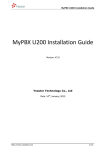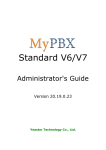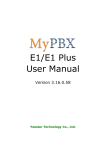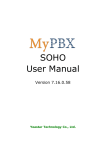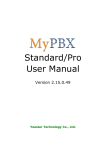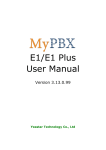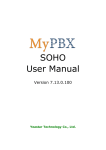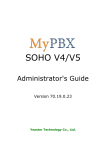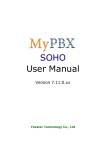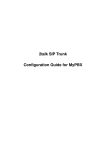Download Yeastar Technology MyPBX U300 Installation guide
Transcript
MyPBX U300 Installation Guide MyPBX U300 Installation Guide Version: V1.0 Yeastar Technology Co., Ltd Date: 25th, July, 2012 http://www.yeastar.com 1/13 MyPBX U300 Installation Guide Contents 1.Preparation before installation .................................................................................................... 3 2. Hardware specifications .............................................................................................................. 4 2.1 Overview ............................................................................................................................ 4 2.2 Led indicators and ports ..................................................................................................... 4 2.3 Specifications and operating environment ........................................................................ 5 3. Mypbx u300 installation ............................................................................................................. 6 3.1 Placement instructions ....................................................................................................... 6 3.2 Installation instructions ..................................................................................................... 6 3.2.1 Connection of ethernet ports .......................................................................................... 6 3.2.2 Connection of E1/T1 ports .............................................................................................. 7 3.2.3 Connection of FXS ports .................................................................................................. 8 3.2.4 Power connection............................................................................................................ 9 3.2.5 Overall flow chart............................................................................................................ 9 4. Mypbx u300 basic configurations ............................................................................................... 9 4.1 Factory defaults ................................................................................................................. 9 4.2 Logging in the web configuration panel .......................................................................... 10 4.3 Network settings .............................................................................................................. 11 4.4 Extensions and setup management ................................................................................. 11 4.5 Configuring terminals ...................................................................................................... 11 4.6 Making/receiving calls ..................................................................................................... 12 4.7 Reset to factory defaults .................................................................................................. 12 5. Conclusion ................................................................................................................................. 13 http://www.yeastar.com 2/13 MyPBX U300 Installation Guide About MyPBX U300 MyPBX U300 is a standalone embedded hybrid PBX specially designed for businesses and offices up to 100 users which is characterized by an embedded PRI(E1/T1/J1)port with up to 30 lines and 2 FXS ports in the one compact system, providing higher density trunking for offices using E1 PRI signaling. It enables the company to benefit from the latest VoIP technology and traditional reliability at the same time. Also it could be used as a gateway to legacy PBX systems in applications. MyPBX U300 has perfect interoperability with mainstream IP Phone brands such as Yealink, Snom, Grandstream, Aastra, Polycom and Cisco. Auto provisioning of Yealink, Snom, Cisco, Aastra and Polycom IP phones would greatly save time on configurations when there is bulk extensions to register. Besides, customers from different countries will all feel comfortable while using MyPBX U300. Because they are able to select their local language for Web GUI and Voice Prompt. Furthermore, it is renowned for its user-friendly web configuration panel which is easy accessible and self-evident making configuration a trouble-free job. This Guide explains how to install MyPBX U300, how to configure MyPBX U300 via web interface, how to add extensions, and make/receive calls via PSTN lines. 1. Preparation before Installation Please make sure the following devices are available before installation: Contents of the box Upon receiving MyPBX U300 gift box, please open the package and check if all the items are supplied as MyPBX U300 Packing List (See Sheet 1). If there is any problem, please contact your provider. Item Unit QTY Description MyPBX U300 PC 1 MyPBX U300 main box Power cord PC 1 For the input of 220V AC power Warranty card PC 1 With Series Number printed for Repair & Return CD PC 1 including all the MyPBX User Manuals and relative documents phone line PC 2 Network Cable PC 1 Serial Line PC 1 Mounting Ear PC 3 M3 Screw PC 9 Long mounting ear: 1 PC; short mounting ear: 2 PCS Sheet 1 MyPBX U300 Packing List http://www.yeastar.com 3/13 MyPBX U300 Installation Guide 2. Hardware Specifications 2.1 Overview Figure 2-1 MyPBX U300 2.2 LED Indicators and Ports Figure 2-2 MyPBX U300 Front Panel http://www.yeastar.com 4/13 MyPBX U300 Installation Guide Figure 2-3 MyPBX U300 Rear Panel LED Power Indication Power status Status On Off RUN MyPBX status Blinking Not Blinking/Off Description The power is switched on The power is switched off MyPBX is running properly MyPBX goes wrong Ports RJ11 ports Ethernet ports Description FXS port: For the connection of analog phones. MyPBX U300 provides two 10/100M adaptive RJ45 Ethernet ports, marked as LAN and WAN. -LAN port: LAN port is for the connection to Local Area Network (LAN). -WAN port: WAN port is the network port for the connection to internet. It supports ‘DHCP server’, ‘PPPoE/dynamic DNS’, and “static IP” for IP address assignment. E1/T1 ports For the connection to E1 line or the E1 port of traditional PBX. Audio Input For the connection to a music-on-hold source port Audio output For the connection to a paging system. port Reset Button Press the reset button to restore the factory defaults Please make sure that you’d like to reset because once reset, the previous configurations would be erased automatically. Power port For the connection of a power adapter to input 100~240V、50~60HZ AC power USB port Console port For debugging 2.3 Specifications and Operating Environment Description Size L213 * W 160 * H 44 (mm) Power Supply 220V,50~60Hz http://www.yeastar.com 5/13 MyPBX U300 Installation Guide Operating Temperature 0°C~50°C (32°F~122°F) Storage Temperature -10°C~65°C (14°F~149°F) Operating Humidity 5%~90% (Non-condensing) Storage Humidity 0%~95% (Non-condensing) Weight 1.2kg 3. MyPBX U300 Installation To avoid unexpected accident, personal injury or device damage, please read the following instructions before installing MyPBX U300. 3.1 Placement Instructions Ambient Temperature: to avoid overheating, please do not run MyPBX U300 in the place where the ambient temperature is above 122℉ (50℃). Ventilation: please make sure that the device has good ventilation around. Anti-jamming—there may be some sources of interference that might affect the normal running of MyPBX U300. It’s highly recommended that the device Should be placed away from high-power radio, radar transmitters and high frequency, and high-current devices. Is using independent power junction box and effective anti-grid interference measures have been taken. Mechanical load--Please make sure that the device is placed steadily to avoid any accident that might cause damage. If placed on the desktop, please ensure it is horizontally placed. 3.2 Installation Instructions After placing MyPBX U300 in a suitable place, please connect the power adapter and all other cables to complete the installation. 3.2.1 Connection of Ethernet Ports MyPBX U300 provides two 10/100M adaptive RJ45 Ethernet ports, that is, LAN port and WAN port. WAN Port Connection Connect one end of a network cable to the WAN port of MyPBX U300, and the other end to the Ethernet port of a hub, switch or ADSL modem. LAN Port Connection Connect one end of a network cable to the LAN port of MyPBX U300, and the other end to any port of company’s LAN switch/router. If the LAN port is connected to PC directly (not via a switch), please use cross-over cable. http://www.yeastar.com 6/13 MyPBX U300 Installation Guide 3.2.2 Connection of E1/T1 ports MyPBX U300 supports one E1/T1 port. Below are the connection instructions. 1. Connection of E1/T1 ports The E1/T1 port could be connected to the E1 line or the E1 port of traditional PBX. Note: the E1/T1 port of MyPBX U300 is RJ45 port, and the pins are defined as below table: Item Description 1 RX- Receive Data- 2 RX+ Receive Data+ 3 Not used 4 TX- Transmit Data- 5 TX+ Transmit Data+ 6 Not used 7 Not used 8 Not used Note: Please follow the below steps to make RJ45 cable to connect it to the E1 port. Step 1: Connect MyPBX U300 E1 port to the E1 line according to the line sequence of E1 port. From the above table, we can see that the No.1 and No.2 pins of MyPBX U300 E1 port is for receiving data (No.1 for receiving data -, No.2 for receiving data +), while No.4 and No.5 is for transmitting data (No.4 is for transmitting data -, No.5 is for transmitting data +). When connected to the E1 line, RX- of E1 port should be connected to TX- of E1 line; RX+ of E1 port should be connected to TX+ of E1 line; TX- of E1 port should be connected to RX- of E1 line; TX+ of E1 port should be connected to RX+ of E1 line. For example, the line sequence o f the E1 line (RJ45 port) provided by the telecom company is: No.4 for TX-, No.5 for TX+, No.7 for RX- and No.8 for RX+ which apparently can’t correspond to that of MyPBX U300 E1 port. So you need jumper, which could be depicted as below: Figure 3-1 Step 2: Connect the self-made RJ45 cable to E1 port. http://www.yeastar.com 7/13 MyPBX U300 Installation Guide Figure 3-2 Connection of E1/T1 port 3.2.3 Connection of FXS ports The FXS port could be connected to an analog phone with a phone line. The connection could be depicted as below: Figure 3-3 Connection of FXS ports http://www.yeastar.com 8/13 MyPBX U300 Installation Guide 3.2.4 Power Connection Once users have made sure that device installation, cable connection and power type is correct, please switch on the power. Then MyPBX U300 will start booting. In the meantime, users would see that the ‘POWER’ and ‘RUN’ indicator lights would turn on. Please switch off the power before plugging or unplugging the cables. 3.2.5 Overall Flow Chart Figure 3-4 Overall Flow Chart 4. MyPBX U300 Basic Configurations 4.1 Factory Defaults MyPBX U300 provides web-based configuration interface for administrator and account user. The user can manage the device by log in the web interface. The factory default IP address: LAN: 192.168.5.150; Access path: http://[IP address] User Name: admin; Password: password http://www.yeastar.com 9/13 MyPBX U300 Installation Guide Default SIP UDP port: 5060 There are 6 extensions set up by default. The user could use these extensions directly, edit or delete them. Their extension numbers are “300”-“305” (6 numbers in a row) whose passwords are “pincode + respective extension number”. 4.2 Logging in the Web Configuration Panel Firstly, please check if the IP address that assigns to the network port (LAN or WAN) is in the same segment with the PC and which can be connected when commit ‘Ping +MyPBX IP address’ command. Start the browser on PC. In the address bar, enter the IP address, click ‘enter’ button and then you can see MyPBX U300 Web Configuration Panel login page (See Figure 4-1). Figure 4-1 MyPBX Web Configuration Panel Login Page Enter the Admin User Name and Password to log in. Figure 4-2 MyPBX Admin Configuration Interface Via the configuration interface, the admin can make all the system configurations, including network settings (LAN, WAN, Firewall, VPN, DDNS, VLAN, etc.); system parameters configuration (system prompts, time zone, password, etc.); internal settings (Web access port, user extension range, business hours, conference room, http://www.yeastar.com 10/13 MyPBX U300 Installation Guide paging and intercom, music on Hold, etc.); inbound routes; outbound routes; user account management (add or delete an extension account, IP restriction, features setup, etc.); extended function management (call queue, conference room, IVR, etc.); call logs (search, download); firmware update and reset, etc. Please note that after saving the changes, please remember to click the “Apply changes” button to make the changes take effect. 4.3 Network Settings After logging in the admin configuration interface, generally the first step is to configure the IP address. If both the WAN and LAN ports are connected to the network, their IP addresses need to be configured. If not, just configuring the IP address of the LAN port which is connected to the local area network of the company is OK. WAN Settings Click “Network Settings”->”WAN Settings” on the left menu bar. 1. If the network that the WAN port is connected to is using DHCP server as connection method, please select the “DHCP” (dynamic IP) option. 2. If the network connection method is “Static IP address”, please select this option and enter the LAN parameters (IP address, subnet mask, default gateway, DNS, etc.) 3. If MyPBX is connected to ADSL adapter directly, please select “PPPoE” option and enter the ADSL user name and password. LAN Settings Click “Network Settings”->”LAN Settings” on the left menu bar of the web configuration interface. LAN port is used for the interoperability of IP terminals and MyPBX. If the LAN port is connected to the company’s LAN, please configure the correct IP address and corresponding subnet mask. Please note that after changing the IP address of LAN port, MyPBX should be rebooted to make the new changes take effect. 4.4 Extensions Setup and management MyPBX has already set up 6 extensions by defaults which are extension”300-305”. The password is “pincode + extension number”. It’s up to the user to use these default extensions directly or after changing the password. Of course, they could be deleted. The admin could add, edit or delete the extensions via the Web Configuration Panel. In the “Extensions” page, there are “Add Extension”, “Add Bulk Extensions”, “Delete the Selected Extension” and “Edit Extension”(configure the features such as call forwarding and voicemail) subpages, etc. 4.5 Configuring Terminals MyPBX could be connected with SIP-based audio and video IP terminal devices (e.g. IP Phone, voice gateway, and soft terminal, etc.). The steps of configuring terminals are as below: http://www.yeastar.com 11/13 MyPBX U300 Installation Guide Step 1: Make sure the IP terminal and MyPBX are interconnected Step 2: Enter the IP address of MyPBX when configuring “SIP server”, “Proxy server”, or “Registration server” of the IP terminals, and the default SIP UDP port is 5060. Step 3: Enter the account registration information with the “extension number/password” of the default or newly setup extensions of MyPBX. For more information on terminal configuration, please refer to http://www.yeastar.com/Solutions/SIP_Phones.asp Step 4: Reboot the IP terminal after configuration, and click “Status Monitor”->”Line Status” on the menu bar of MyPBX web configuration interface to check if it has registered successfully to MyPBX. 4.6 Making/Receiving calls Note: The MyPBX default settings are sufficient to make phone calls. It is not necessary to make any changes unless the user wants to create new extensions or trunks. Refer to Administrator’s Guide for more. 1. Internal calls between extensions If two IP terminals have registered to MyPBX successfully, the user could make calls between extensions just by dialing the other’s extension number. 2. Outbound calls Firstly, please connect a PSTN line to the first FXO port. Then the default extensions are able to make outbound calls via this trunk by simply dialing “9+phone number+#”. The “#” is Key as Send. Note: The dial pattern of the default outbound route is “9.”. But if the user has changed it, please dial the new prefix instead of the digit “9” when making outbound calls. 3. Inbound calls When the user calls the trunk number of the PSTN line, MyPBX would route the call to IVR (the “welcome” prompt) by default. Then the user can dial the extension number following the prompt. 4.7 Reset to Factory Defaults If you forget the new IP address or the password of admin, or in other cases that you would like to restore the factory defaults, please reset the device following the below instructions: Please press the “RESET” button located in the back panel with a paper clip or a pencil tip, then you can see all of the LED indicators in the front panel would all turn red first and turn orange seconds later. When the indicator light becomes orange, the button could be released and system begins to reset. During the process, please do not power off until the LED indicators become normal which means the reset process is completed. Note: After resetting, all the configurations made by the admin would be erased. http://www.yeastar.com 12/13 MyPBX U300 Installation Guide 5. Conclusion This Installation Guide only explains the installation and basic settings of MyPBX U300 for making and receiving calls. For more functionality and advanced settings of MyPBX U300, please refer to the relative documents as below: “MyPBX U300 Datasheet” “MyPBX U300 Administrator’s Guide” “MyPBX U300 User’s Guide” [The End] http://www.yeastar.com 13/13













